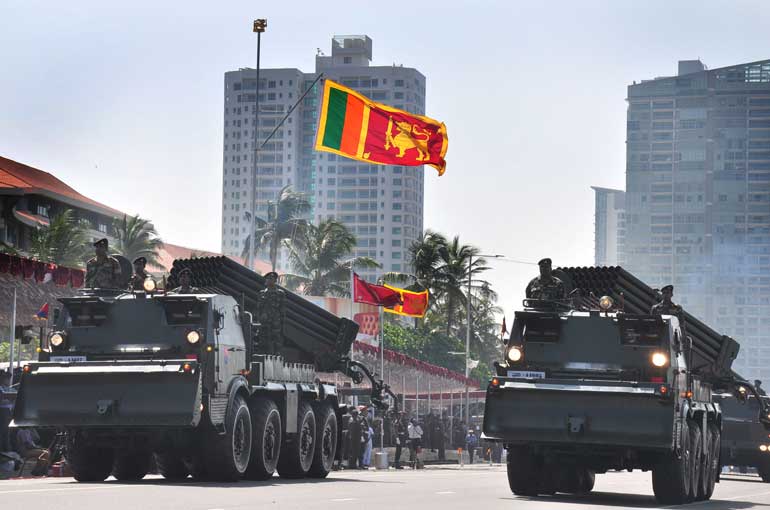Tuesday Feb 17, 2026
Tuesday Feb 17, 2026
Saturday, 9 April 2016 00:00 - - {{hitsCtrl.values.hits}}
 By Navodinee Wickramanayake
By Navodinee Wickramanayake
Growing up in a time when our country was torn by civil war, we are not a generation which is unfamiliar to the impact and effects of ‘difference.’ In fact we have all seen its extremes play out in front of own our eyes. If there is one thing being born into such brutality has taught me, it is the power of those differences.
I am not one to dwell on the past. Looking at Sri Lanka today, it is evident that we are not the nation that once lived in fear of suicide attacks and planted bombs. However, in the absence of a common enemy, other forms of civil unrest and hatred seem to have risen its ugly head. Unrest triggered yet again, by our differences.
‘Sri Lankan pride’
As Sri Lankans, we take pride in our multiculturalism and happily embrace the many perks that come with it. However, it is troubling  to notice that in most instances, ‘Sri Lankan pride’ may sometimes come off as selective. We embrace our differences when it is beneficial to us and discredit them when it isn’t. This is not a healthy or sustainable way to move forward. Thirty years of war have left us wounded and it is important to bear in mind that in the process of healing, we must do so in a manner that ensures complete restoration with the ability to maintain sustainability and growth.
to notice that in most instances, ‘Sri Lankan pride’ may sometimes come off as selective. We embrace our differences when it is beneficial to us and discredit them when it isn’t. This is not a healthy or sustainable way to move forward. Thirty years of war have left us wounded and it is important to bear in mind that in the process of healing, we must do so in a manner that ensures complete restoration with the ability to maintain sustainability and growth.
Over the past few years, I had the opportunity to travel to several corners of the world. I was also able to live in a highly multi-culturally diverse community. I had the chance to see and meet people who are entirely different to the people I know and this inspired me to explore what could be achieved if we looked at our differences as complementary and not contradictory.
I realised that humanity is universal. Our instincts, our hope and dreams are all similar content. Our difference is in our backgrounds, circumstances and experiences that change the way we face challenges and reach our goals.
In most instances, differences do not alter what we want for ourselves on a fundamental level. It only changes the way we approach them. For the longest time, we as a nation have tried to set aside our differences and find common ground. As a result of this, we often end up making biased decisions or not finding strategies that can withstand the test of time or be fair and applicable to all of us.
Ethnic identities
Respondents to a National Youth Survey displayed strong awareness of ethnic identities, with 46% saying their sense of belonging to their ethnic group intensified after the war ended in 2009. The National Human Development Report (2014) also highlight how 36.2% of youth suggest ethnicity as a major dividing factor in Sri Lanka. This reality is ever so present even today and is mostly due to the fact that we have been trained to believe differences are a hindrance to unity and coexistence and therefore should see  past them. In reality this means our culture has in some way prevented us from building attitudes that foster acceptance to diversity.
past them. In reality this means our culture has in some way prevented us from building attitudes that foster acceptance to diversity.
It is impractical and harmful to say that we should look past our differences. They are the best chance we have towards creating meaningful change.
What if, we took the very differences that divide us and instead of looking at them as barriers, or something to set aside, used them to come up with inclusive and sustainable solutions for today’s problems? If what we have been doing so far by trying to set our differences aside and only agree where we find similarity has not given us the results we hope to acquire, why not change the way we look at the problem itself?
Youth participation
Youth participation and involvement could play a key role in integrating our differences to achieve sustainable solutions. The National Youth Policy indicates 4.4million (23%) of Sri Lanka’s population to comprise of youth. According to the NHDR a hopeful 88% of this 4.4 million state their interest in socio-economic development. Youth also have a fresher perspective and are passionate, inclusive and less divisive.
Therefore, it is imperative to provide them credible platforms where they can share ideas and also include their voices in decision making, not only for formalities but to be taken into serious consideration when finding solutions. It is also important that youth involvement be made more accessible to those from a range of backgrounds and experiences in order to have the best results. The UN Security Council’s’ Resolution 2250 on Youth Peace and Security adopted in December last year could provide ideas and guidelines as to how we can further engage and mobilise our youth in the hopes of inclusive problem solving.
Learn from mistakes
Today, as extremist political parties, religious and sectarian violence have posed a yet another threat to our country’s peace, it has never been more important to learn from our past mistakes and start implicating more innovative means to assess as well as solve evolving issues keeping inclusion and diversity in mind. However, change is not something we can simply achieve overnight, nor is it something that can be applied as a mass reform in Government policy. It starts with each of us making a conscious effort to alter the way our minds process differences among people.
(To find out more on possible ways to improve and advocate for youth involvement in any capacity check out >> http://unoy.org/wp-content/uploads/Guide-to-SCR-2250.pdf and follow the conversation at #Youth4Peace & #SSCR2250)
(UNLOCKED is a space for Sri Lankan youth to express their views and opinions on development with the aim of creating positive change in the world. The views expressed in the blogs are solely those of the authors. UNDP Sri Lanka and Daily FT does not represent or endorse the views expressed in these blogs. Read more about the UNLOCKED initiative www.lk.undp.org.)